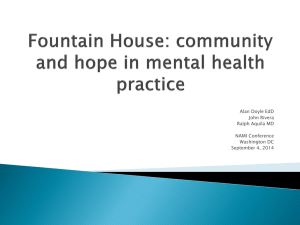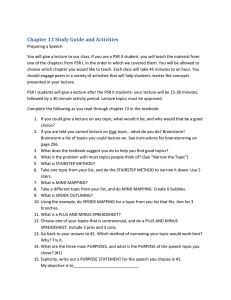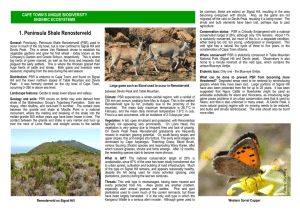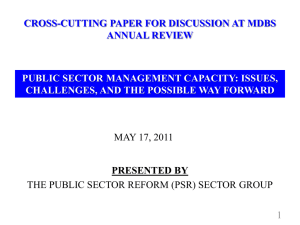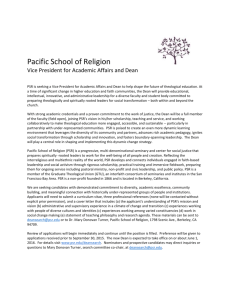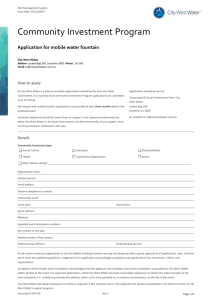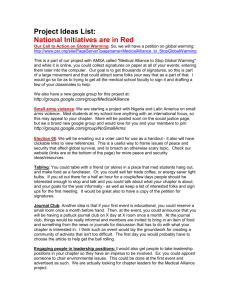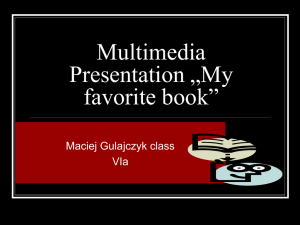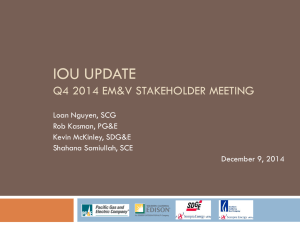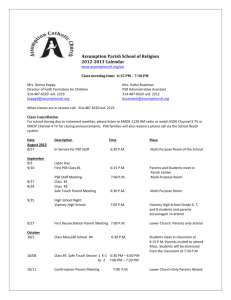Psychosocial Rehabilitation for people with mental illness in the
advertisement
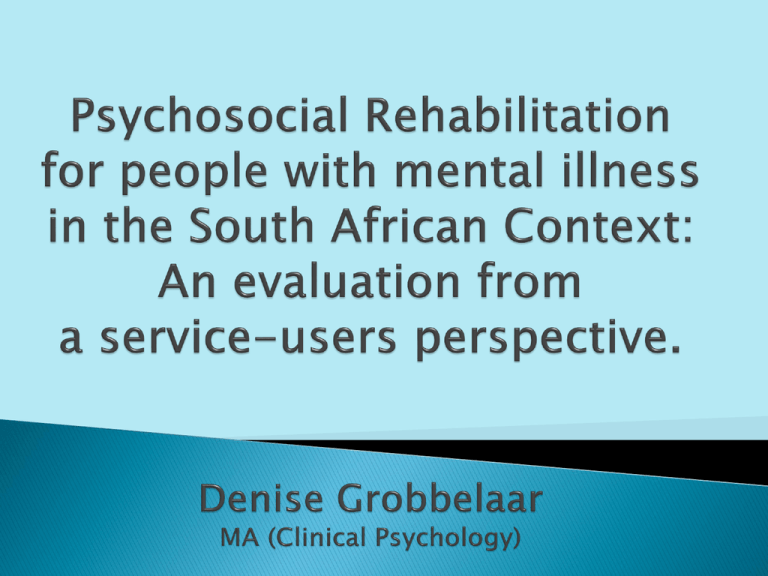
“Well, shortly after a breakdown – I am talking about my own experience – you feel raw. You are very sensitive and you are easily hurt. It is not easy to identify with people’s intentions just after having had a breakdown – it’s difficult to identify with people’s intentions because your thought patterns are very scattered, and it’s like you are reaching up to grasp some type of meaning of what’s going on around you...” Member of the Cape Consumer Advocacy Body (CCAB) Social isolation Loss of attachment Withdrawal of interest According to Anthony (1993), recovery is “a deeply personal, unique process of changing one’s attitudes, values, feelings, goals, skills and/or roles. It is a way of living a satisfying, hopeful, and contributing life even with limitations caused by the illness. Recovery involves the development of new meaning and purpose in one’s life as one grows beyond the catastrophic effects of mental illness." Valued outcomes according to service-users “ What was the most significant change, for you personally, since participation in the programme?” versus Cape Mental Health Society’s objectives and aims for it’s Psychosocial Rehabilitation (PSR) programmes The four PSR programmes of Cape Mental Health Society includes: Fountain House clubhouse model, Community-based support groups (Rainbow Foundation), Cape Consumers Advocacy Body (CCAB), Supported housing (a group home called Kimber House). (Cape Mental Health Society, 2007) Qualitative Design 9 Focus Groups Participants: 60% Schizophrenia 20% Bipolar Mood Disorder 10% Major Depressive Disorder 10% Other = 44 service-users Social connection and interaction Socialization Improved interpersonal interaction and activity, Associated benefits of a supportive community, Improved social skills. opportunities for socializing and meeting people; having somebody to talk to; gaining friendships; “I am glad to talk to people. I am glad to have got friends at Fountain House. Friends in the location (township) are not nice like the friends I’ve got here at Fountain House. I am better now I have got these friends.” “safe space” free of judgement and stigma “... the group, having been able to come and sit and relax, just be yourself, not any judgments by other people on how you behave, what they expect from you. And it helps the confidence when you are away. And when you are going through something bad, you think back on the Wednesday [the group], it picks you up, it helps you to cope through whatever it is at that stage you are going through” “safe space” Includes encouragement and affirmation “[Within the group] The encouragement part and the motivation and inspiration as well. Before, I couldn’t speak to anyone – I was very shy, I had no confidence at all – I had no dignity myself – I couldn’t look out or walk outside; and since I’m over here, basically, everything has changed for me. I see a different outlook on life.” an increase in a sense of belonging normalisation which universality provide within a group. “People make you happy if they always ask how you are today. You feel like you are accepted in life....” “...then I know this place [Fountain House], and then I feel this is the place to be; and I like this place, because I gain a lot of experience from this place, you see.” increased ability to relate to others; increased ability to communicate and engage in conversation; and opening up, expressing one’s feelings and sharing oneself. “For me, PSR was the first step or so, on the ladder to recovery. Even when you start off with PSR you don’t want to participate and you see everybody – old members – opening up and confiding in one another, and then that helps you to relate to people, which is one of the steps crucial to the socialising.” “I'm speaking from personal experience now, it [the group] does help you, it gives you that confidence to come out and talk and just take that first step towards socialising, which was – for me – one of the biggest steps of recovery.” “...I have never thought of myself as a talkative person, because I was a very shy person. And it amazed me to see how many friends I have collected over the years at Fountain House, so they have also helped me a lot. I did not have to be on my own anymore, I could sit in a group of people and they would listen to what I have to say.” Increased confidence, self-esteem, gaining hope, improved positive attitude, self-knowledge and acceptance, increase in motivation, increased vitality, increased awareness and interest in life, finding purpose and meaning. “It all made it worthwhile to continue with my life and all that. If there had been no Fountain House, I would just have gone back, I most probably would have remained very sick all my life. But now the quality of my life has improved so much, I cannot begin to tell you how happy – not happy, it is not the word, how my attitude towards life has, like, changed; from, like, negative to much more positive.” providing support and developing support networks, enhancing the socialising of its members and building social skills, providing a safe and secure environment; fostering belonging, providing hope, personal growth through skills development …providing safe spaces, creating opportunities for meaningful interactions with others, enhancing a sense of self From LOSS “I find it hard to trust people and to get their trust – to trust in me – and to bond and have a social life. I find that is very difficult to interact…” PSR Group member To RECOVERY “...when you get to that situation where you are feeling on top of things, you are getting on well with your family, your relationships are good – those are all fantastic things and that can only help to then keep you well.” Member of (CCAB) Thank You

